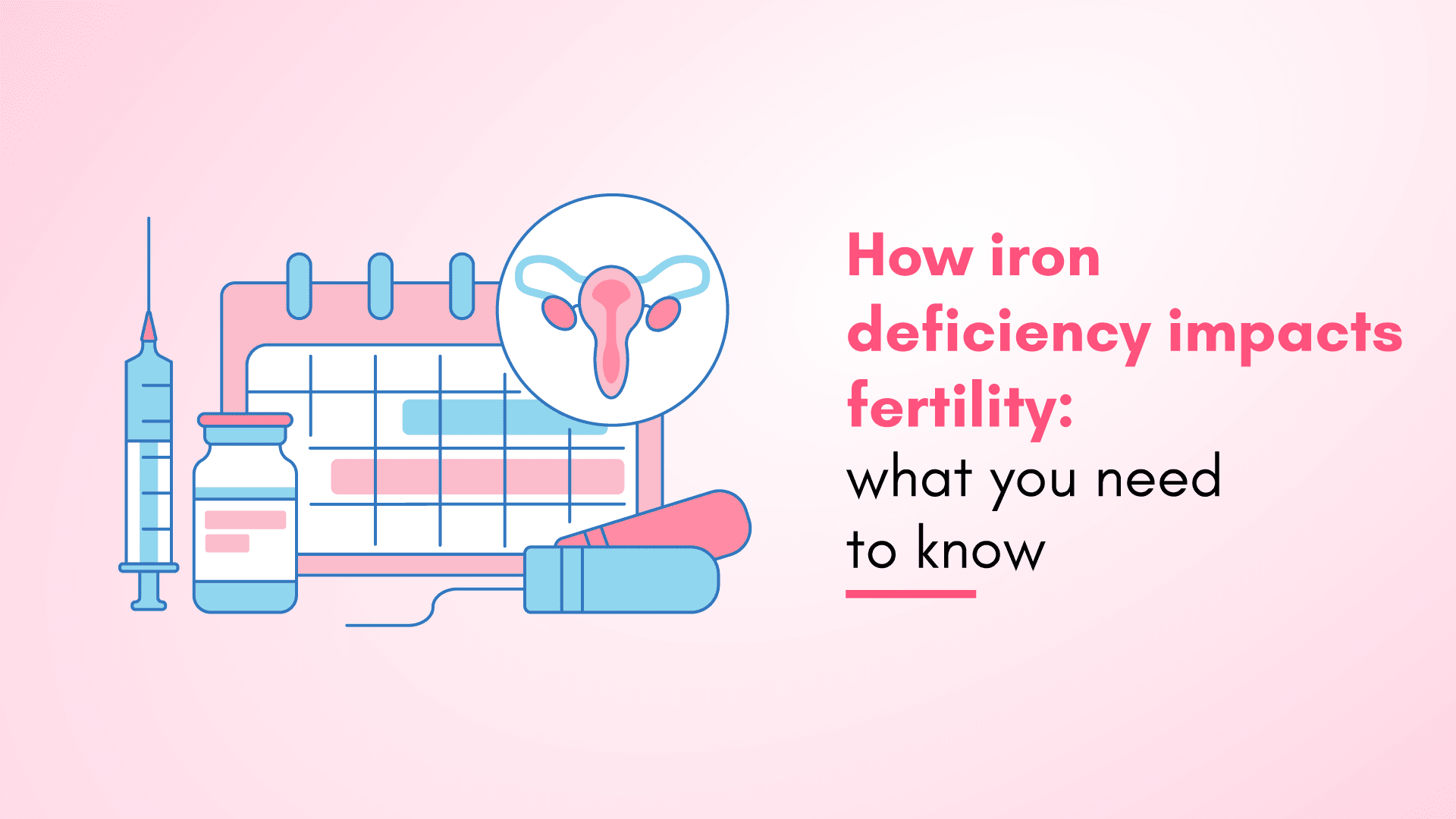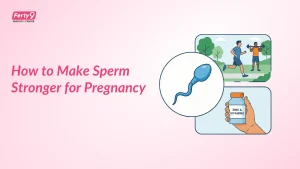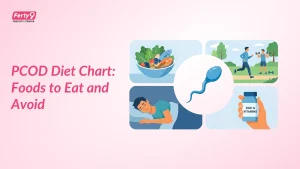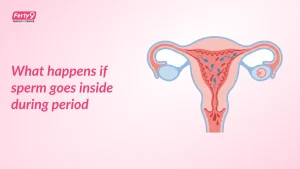Have you ever wondered how certain factors affect fertility? Iron, an essential nutrient, plays a crucial role beyond preventing anemia. Its impact on fertility is profound yet often underestimated. Understanding this connection is vital for those planning to start a family or facing challenges in conceiving.
In this blog, we’ll explore the significant implications of iron deficiency on fertility, shedding light on its effects and strategies to optimize your health. Let’s delve into this critical aspect of women’s health and fertility to empower informed choices and better outcomes.
Suggested Read:
Boosting Naturally Male fertility with Diet, Lifestyle Changes
Foods and Supplements That May Boost Male Fertility
What is Iron Deficiency and Anemia?
Iron deficiency is the lack of iron in the body. This reduces the ability of red blood cells to produce hemoglobin, which carries oxygen in your blood. This situation leads to anemia, which is also called iron deficiency anemia.
Anemia is defined as a reduction in the number of red blood cells or the amount of hemoglobin they contain, which impairs the ability of your blood to carry oxygen to tissues. According to the World Health Organization (WHO):
- For men, anemia is defined as a hemoglobin (Hb) level of less than 13 grams per deciliter (g/dL).
- For non-pregnant women, anemia is defined as a Hb level of less than 12 g/dL.
- In pregnant women, anemia is diagnosed if Hb levels fall below 11 g/dL at any point during pregnancy.
For a more detailed classification of anemia during pregnancy:
- First and third trimesters: Hb levels less than 11 g/dL.
- Second trimester: Hb levels less than 10.5 g/dL.
While iron deficiency may initially go unnoticed, it can lead to various complications later on. Besides affecting multiple organs, low iron affects both female and male fertility, affecting their chances of getting pregnant.
The Role of Iron in the Body
Other than producing hemoglobin in your blood, there are several other roles that iron plays in our body:
- Conversion of blood sugar to energy and stimulating the secretion of various enzymes
- Boosting the immune system
- Supports muscle function and cognitive development
- Providing iron to the fetus during pregnancy
- Maintaining healthy skin and hair
How Does Iron Deficiency Affect Fertility?
Iron deficiency can play a significant role in affecting fertility for both women and men. For women, insufficient iron levels can disrupt menstrual cycles, potentially leading to irregular periods or even amenorrhea (the absence of menstruation). These disturbances can hinder ovulation, making it more challenging to conceive. Iron deficiency may also reduce egg quality, heightening the risk of miscarriage and complicating pregnancy. Additionally, it can impact libido and overall maternal health, further affecting reproductive outcomes.
In men, low iron levels can diminish sperm production and count. It also affects sperm motility and morphology, which are essential for successful fertilization. Poor sperm quality, combined with reduced libido and potential erectile dysfunction, can complicate conception efforts. Iron deficiency can also increase DNA damage in sperm, potentially leading to genetic issues.
Ensuring adequate iron intake through diet or supplements is crucial for optimizing fertility and overall reproductive health.
Symptoms of Iron Deficiency
Iron plays a vital role in numerous bodily functions, so it’s no surprise that its deficiency can affect overall well-being. Here are some common symptoms to watch for that could indicate low iron levels:
- Fatigue
- Dizziness
- Excessive tiredness
- Pale skin
- Shortness of breath
- Headaches
- Skin damage
- Sore tongue and mouth
- Brittle nails
- Susceptibility to infections
- Cold hands and feet
- Unusual cravings for non-nutritive substances like ice or dirt (pica)
In more severe cases, it can cause difficulty swallowing, rapid heartbeat, restless legs syndrome, and hair loss. Iron deficiency anemia may also lead to cognitive and developmental delays in children. Prompt diagnosis and treatment are essential to alleviate symptoms and prevent long-term health issues.
Causes of Iron Deficiency
There could be a lot of reasons behind an iron deficiency—often intertwined with dietary choices, medical conditions, and bodily functions. Therefore, it’s crucial to identify the underlying causes to address and manage this common yet impactful health issue effectively. Here are several factors that might be causing low iron levels in your body:
- Inadequate dietary intake of iron-rich foods
- Blood loss from heavy menstrual periods or gastrointestinal conditions like ulcers or polyps
- Increased iron requirements during pregnancy or growth phases
- Inability to absorb sufficient iron due to gastrointestinal disorders like celiac disease or gastric bypass surgery
- Blood loss through urine
- Rare genetic conditions that prevent the body from absorbing iron
- Use of certain medications that interfere with iron absorption
Diagnosing Iron Deficiency
Since iron deficiency is one of the factors affecting fertility, you must be diagnosed with it as early as possible to ensure you and your partner are fertile. Diagnosing iron deficiency typically involves:
- Blood Tests: Checking hemoglobin levels, hematocrit, serum ferritin, and transferrin saturation.
- Medical History and Physical Exam: Assessing symptoms, dietary habits, and potential sources of blood loss.
- Additional Tests: Conducting tests to determine the underlying cause, such as endoscopy for gastrointestinal conditions or genetic testing for hereditary disorders affecting iron metabolism.
Treating Iron Deficiency
Treating iron deficiency affecting fertility involves:
- Iron Supplementation: Taking oral iron supplements to replenish iron levels.
- Dietary Changes: Consuming iron-rich foods such as red meat, poultry, fish, beans, and leafy green vegetables.
- Treating Underlying Causes: Addressing conditions like gastrointestinal disorders or heavy menstrual bleeding that contribute to iron loss.
- Monitoring: Regularly evaluating iron levels through blood tests to assess response to treatment and adjust as needed.
Preventing Iron Deficiency
Prevention is always better than cure, and there are several ways you can naturally avoid low iron levels causing infertility:
- Eating Iron-Rich Foods: Include lean meats, poultry, fish, beans, lentils, tofu, spinach, and fortified cereals in your diet.
- Enhancing Absorption: Pair iron-rich foods with vitamin C-rich foods (e.g., citrus fruits and bell peppers) to boost iron absorption.
- Avoiding Inhibitors: Limit consumption of coffee, tea, and calcium-rich foods during meals, as they can hinder iron absorption.
- Supplementation if Necessary: Take iron supplements as a healthcare provider advises, especially during pregnancy or if dietary intake is insufficient.
- Regular Screening: Undergo routine health check-ups and blood tests to monitor iron levels and address deficiencies early.
When to Seek Professional Help
Seek professional help for iron deficiency if you experience persistent symptoms or are at risk due to heavy menstrual bleeding or pregnancy. It’s crucial to address iron deficiency promptly, especially for women trying to conceive, as it can impact fertility and pregnancy outcomes.
Wrapping Up
Iron deficiency affects fertility in both men and women, with a critical impact on women’s reproductive health as the fetus develops in the womb. Adequate iron levels are vital for fetal growth and development. If you’re planning to conceive, addressing iron levels in both partners and seeking treatment for deficiencies can enhance your journey towards hope to happiness and a successful conception.
To ensure you’re on the right track, consult our fertility expert for personalized advice and treatment options tailored to your needs.





























